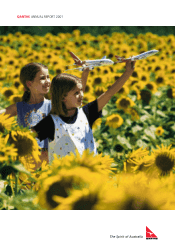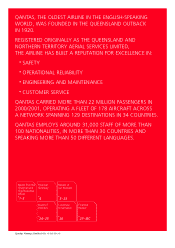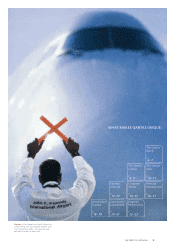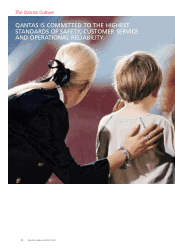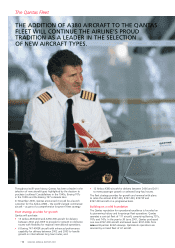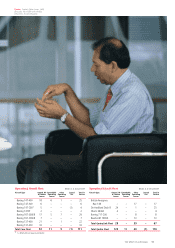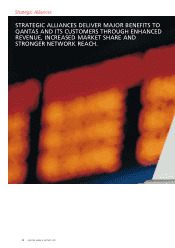Qantas 2001 Annual Report Download - page 4
Download and view the complete annual report
Please find page 4 of the 2001 Qantas annual report below. You can navigate through the pages in the report by either clicking on the pages listed below, or by using the keyword search tool below to find specific information within the annual report.
p2QANTAS ANNUAL REPORT 2001
Report from the Chairman and Chief Executive Officer
Solid results
Qantas delivered a profit of $597.1 million before tax for the
year ended 30 June 2001 and a profit after tax of $415.4 million.
The Directors declared a fully franked final dividend of 9 cents
per share, bringing total fully franked dividends for the year to
20 cents per share and maintaining the payout ratio of 60 per cent.
Revenue totalled $10.2 billion, a record for Qantas and an
increase of $1.1 billion, or 11.9% on last year. Total expenditure
for the year, however, increased by 15%. Higher jet fuel prices
were a major factor; in addition, Qantas commenced investing
in new aircraft and improved services for customers.
Qantas International operations continued to make a strong
contribution to the Group’s performance during the year,
with earnings before interest and tax rising 22.4 per cent to
$458.7 million. While this significant profit was assisted by the
Sydney Olympics, it was delivered in a year in which many airlines
around the world reported losses or small profits.
Qantas’ Australian domestic operations were placed under
great pressure, with earnings before interest and tax down
53.2 per cent to $127.4 million. This reflected significant price
discounting, a weak Australian dollar, an overall slowing in the
Australian and international economies, introduction of the GST
and, as indicated above, high fuel prices.
Qantas has a range of subsidiary operations, including regional
airlines, Qantas Holidays and Qantas Flight Catering. The overall
contribution of these subsidiary operations was reduced over the
year, due mainly to the difficult operating environment faced by
the regional airlines.
Australia’s global airline
Qantas goes forward with the aim of retaining and enhancing
its status as Australia’s global airline. The company draws strength
from its Australian identity and global reputation for safety,
reliability, engineering excellence and customer service.
Over the year Qantas carried more than 22 million passengers,
operating a fleet of 178 aircraft across a network spanning 129
destinations in 34 countries. The Qantas network expanded, with
increased services on our major routes including London, Rome,
Los Angeles and New York. Less profitable routes were replaced
by codeshare services with partner airlines.
In November 2000, Qantas announced it would purchase 31 new
aircraft as part of a substantial long-term fleet strategy. Qantas
will be one of the first airlines in the world to acquire the Airbus
380, the world’s largest commercial aircraft. These investments
will allow Qantas to replace older aircraft, provide capacity for
growth and ensure we maintain our long-held reputation for
leadership in industry innovation.
Customer service is being upgraded. Qantas commenced
installation of a $300 million Total Entertainment inflight system
on its international fleet of Boeing 747-400 aircraft. The Cityflyer
express service, with flights every half hour between Sydney and
Melbourne, was launched. And Qantas introduced a new range
of domestic Economy Class meals, inspired by renowned chef
and restaurateur Neil Perry.
Qantas employs 31,000 staff of more than 100 nationalities
in over 30 countries. We thank each and every one of them
for their dedication and hard work during a year of tremendous
change. During the year, Qantas won awards for customer service
and product and maintained its reputation as Australia’s best
known company.
Qantas continued to rely on strategic alliances to create the scale
and scope to deliver greater benefits to customers and improve
its return to shareholders. Qantas is a foundation member of the
oneworld alliance that brings together eight of the world’s leading
airlines. Qantas also maintained bilateral agreements with British
Airways, American Airlines and Japan Airlines and codeshare
arrangements with a number of other airlines.
Board changes
Since the last Annual Report, we welcomed Rod Eddington to the
Qantas Board in February 2001. We would like to record Qantas’
Board and Management’s gratitude to Lord Marshall, who retired
from the Board during the year.
Geoff Dixon was appointed Chief Executive Officer in March 2001,
following the retirement of James Strong. As a member of the
Board for 10 years and Chief Executive and Managing Director
for more than seven years, James Strong made an outstanding
contribution to Qantas. We wish to record the Board’s appreciation
to James and wish him all the best for the future.
Going forward
The company’s performance in 2000/01 confirms that Qantas
is a disciplined and robust airline, ready to meet all challenges.
In the coming years, Qantas’ success will depend not just on
superior operational reliability and service but also on developing
strong economies of scale and scope through global alliances
and partnerships.
The Board and Management of Qantas will continue to invest
wisely, and seek out the cost efficiencies, structural changes and
the legislative and regulatory freedoms to ensure the company
is well placed to build on its record of success.
Chief Executive Officer Geoff Dixon
Chairman Margaret Jackson

